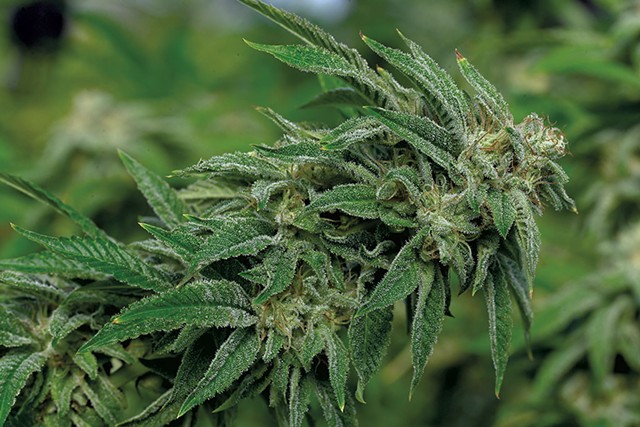
- Jon Olender
- Flowering cannabis at Good Pot Co.
Chris Van Den Meiracker moved to Vermont 17 years ago to build and overhaul electrical substations for the state's energy grid. The job paid well enough to support his family, but the South Carolina native never enjoyed the work. So, shortly after Vermont's adult-use cannabis market opened in October 2022, Van Den Meiracker took a job as a dispensary budtender.
The switch from dealing with high-voltage lines to high-potency weed aligned better with Van Den Meiracker's interests, but the longtime cannabis consumer wanted to dig deeper into the industry. In May, the 39-year-old Jericho father of two enrolled in the Cannabis Studies Certificate Program at Vermont State University-Castleton. Students earn 12 credits by completing three courses and an internship.
"From the very beginning, we knew our program would be attractive to nontraditional students," said professor Philip Lamy, who helped create the certificate six years ago.
In an aging state, the cannabis curriculum addresses many of the problems that policy makers have been discussing for years. The program is attracting young people to Vermont, educating them in a sector now worth tens of billions of dollars nationally. It's created a career pipeline for weed-savvy workers and spun off homegrown businesses. More than 1,100 people are already licensed by Vermont to work in cannabis establishments, but the industry's demand for interns has outstripped the supply of students to fill the positions, Lamy noted.
The program has also helped the financially beleaguered state university system boost enrollment from outside Vermont: Roughly half of the cannabis students live elsewhere and attend classes remotely. Though just 55 students have completed the certificate, Lamy said, more than 1,000 have taken at least one of its courses.
With the program's growing popularity, colleges and universities around the country have been approaching Lamy seeking to duplicate his success on their own campuses.
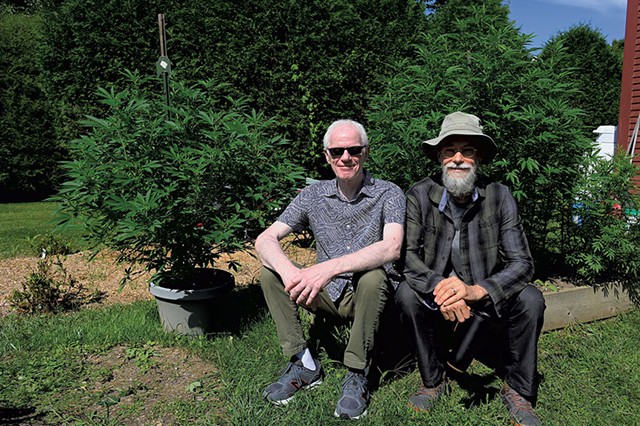
- Jon Olender
- Philip Lamy and Brendan Lalor in Lamy's Castleton backyard
"There are lots of programs out there," he said. "But none of them are offering what we have."
How did a sociology and anthropology professor starting his 33rd year of teaching get involved in the cannabis program?
The 68-year-old baby boomer came of age in the 1960s, when smoking grass played an integral role in youth counterculture. For years, Lamy has taught a course on the social and political movements of the 1960s. It includes readings and discussions about the role that cannabis and psychedelic drugs played in those movements.
Lamy also acknowledges a lifetime of independent study.
"I've been a longtime marijuana smoker, to be completely candid about it," he noted.
About seven years ago, as the Vermont legislature was considering legalizing adult-use sales of the drug, Lamy and several of his colleagues at Castleton began to notice a proliferation of cannabis misinformation in the press. After nearly a century of prohibition and the failed war on drugs, Lamy was hearing many of the same myths and misconceptions circulating about weed that had been debunked years ago. They included claims that marijuana is a "gateway drug" for kids, that it causes cancer and that legalization would result in higher rates of substance abuse. Lamy found it particularly troubling that many of these claims were made by medical and mental health professionals.
"These were people who should know better," Lamy said. "But the point is, they didn't know better."
In 2017, Lamy proposed a new course at Castleton called "Cannabis, Culture and Consciousness." He would co-teach it with Brendan Lalor, a philosophy professor who specializes in cognitive science, with a research emphasis on fungi and psychedelics.
The proposed course wasn't without its critics, some of whom argued that it would become a "drug class" that endorsed pot smoking. A few faculty members wanted to prohibit the instructors from discussing their own — or students' — marijuana use. Despite the objections, the faculty assembly approved the course by a more than two-to-one vote.
Initially, Lamy and Lalor set it up as an upper-level class for 15 students, primarily juniors and seniors. When the course filled up within two hours of going online, the dean asked the professors to expand it to 20 students, then 25. Even then, it generated a long wait list.
"I've never had this, in all my years of teaching, where we had students say, 'Can we just sit in on your class? We'll even sit on the floor," Lamy recalled with smile. "We knew we'd struck a chord."
The following year, they created the 12-credit interdisciplinary Cannabis Studies Certificate Program, which added two new courses: a cannabusiness class, taught by Jody Condon and Tim Egan; and a cultivation course, taught by plant scientist Jonathan Kaplan. They also added the 144-hour internship requirement.
Egan, who's been teaching business at Vermont State's Lyndon and Johnson campuses for about a decade, is a former New Hampshire lawmaker who chaired that state's House Cannabis Caucus. With a background in media, marketing and green energy in the cannabis industry, he's been involved for years in writing bills and lobbying for legalization in the Granite State. The cannabusiness class is now the program's most popular, regularly enrolling students who are pursuing unrelated majors and careers.
At its core, Egan said, the cannabusiness course covers fundamentals such as marketing, branding and supply chains, with an emphasis on the unique challenges presented by this long-stigmatized product. They cover the various regulatory hurdles that exist in banking, financing, licensing and even zoning in communities that aren't cannabis friendly.
The course also provides budding entrepreneurs with the essential tools for starting their own companies. Each student drafts a business plan, then pitches it at the end of the semester to their professors, classmates, and two people from the industry who critique and evaluate their proposal.
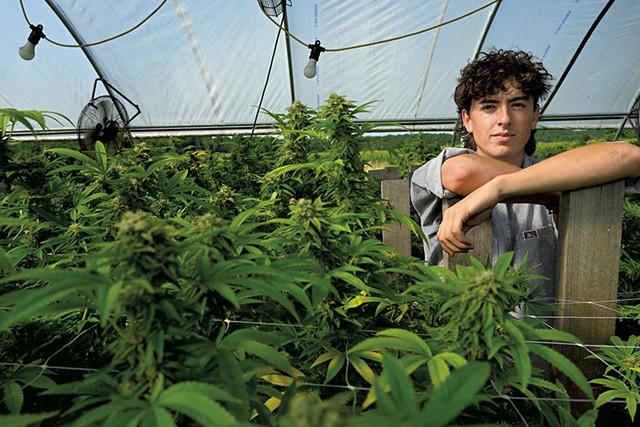
- Jon Olender
- Oliver Duncan of Good Pot Co. in his light-deprivation greenhouse in Addison County
A few have gone on to start companies. Oliver Duncan, a 22-year-old native of Brooklyn, N.Y., moved north in 2020 to attend the University of Vermont. After two years, he took a break and enrolled in the Cannabis Studies Certificate Program. He wrote a business plan and, in 2023, launched Good Pot Co., which grows cannabis outdoors and in hoop houses in Addison County.
"Coming into the legal market was a bit of a jump in size and scale for me," said Duncan, who had grown illegally when he was younger. Despite some crop losses from flooding, his business is turning a profit.
For Duncan, one of the best parts of the program was the networking and industry contacts he made. His cultivation instructor, Christine Motyka, now works as an inspector for the Vermont Cannabis Control Board, which regulates the market.
Egan, who codirects the internship program, has placed students in a variety of professional settings. One student who's interested in science and cooking just finished an internship designing recipes for an edibles company. Another is developing packaging and shipping operations for a grower they first interned with.
"This is a younger person's industry," Egan said. "How do we get young people to stay in Vermont? Create a workforce marketplace that they want to be in and create opportunities for them."
Last summer, Egan lined up a student with the first-ever internship at the Cannabis Control Board. Grace Labella conducted research as part of the board's efforts to revitalize Vermont's medical cannabis dispensaries.
"It was incredibly valuable to have an eager student who was not only interested and knowledgeable in the subject matter but also skilled in research," board commissioner Julie Hulburd said in an email. "I hope that we will have future opportunities for interns from the VTSU Cannabis Studies Program."
The board and the Vermont Agency of Commerce and Community Development are also encouraging social equity license applicants — people from populations that were disproportionately affected by cannabis prohibition — and so-called legacy growers, who may have decades of know-how and experience cultivating weed but little formal business training, to work with Vermont State University. They can even apply for grants to cover the cost of their education.
The control board has also asked the university to become one of the state-approved vendors that train dispensary workers. Eventually, the university's program may train dispensary workers for other states.
Beginning this fall, the university's Resort and Hospitality Management program will host cannabis studies courses at its Killington Resort campus.
"Our students are definitely interested in it because it's such a rapidly growing industry," said Kristel Killary, assistant professor and program coordinator. "Even if they're not interested in going into that [industry], it's a résumé builder and something to be more knowledgeable about."
Much the way ski resorts operate bars and host craft beer festivals, Egan eventually expects weed to become another business opportunity in the après-ski scene.
"When do the ski lifts all stop? At 4 o'clock. What happens 20 minutes later?" he said, referring to the traditional time — 4:20 — when stoners light up.
Lamy said he's been surprised by the number of high school students and their parents who've contacted him about enrolling in the program to earn early college credit. They can, Lamy tells them, with the caveat that students who are under 21 are legally prohibited from growing cannabis or working in a dispensary. Instead, they can do an internship on a hemp farm or in other settings that don't come in direct contact with the plant, such as at a law office or marketing and design firm.
Next year, Lamy hopes to add a course on the medicinal and therapeutic uses of cannabis. As he noted, its history dates back more than 5,000 years to emperor Shen Neng of China, who prescribed marijuana tea for the treatment of gout, rheumatism, malaria and poor memory. "We're not discovering the medical uses of cannabis," Lamy said. "We're rediscovering what the ancients already knew."
One other surprising discovery for Lamy: the number of students who are not cannabis consumers themselves and have never even tried it. Some have friends or family members who do so, while other are fascinated by the history and uses of the plant.
After Van Den Meiracker, the current student, completed his coursework in the history, culture, science, cultivation and business of cannabis, he scored two internships: one with Family Tree Cannabis, a cultivator in Sheldon Springs; the other with the Cannabis Retailers Association of Vermont. At the latter, he's helping the industry trade group raise disaster-relief funds for weed farmers and companies impacted by recent flooding.
"It's nice because I'm getting a view of everything, from cultivation to marketing," he said.
While Van Den Meiracker isn't sure where he'll eventually land in the industry, he knows that opportunities abound. He's had two job offers already.






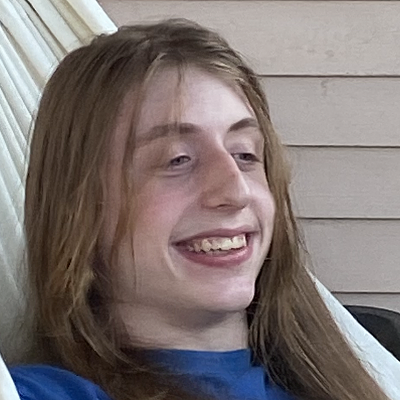

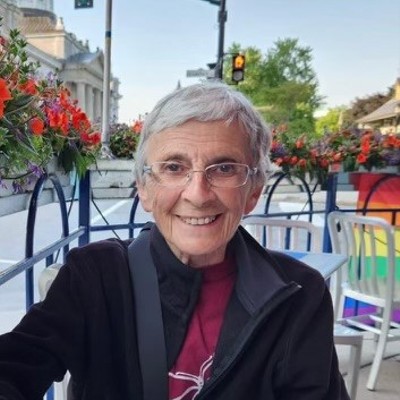
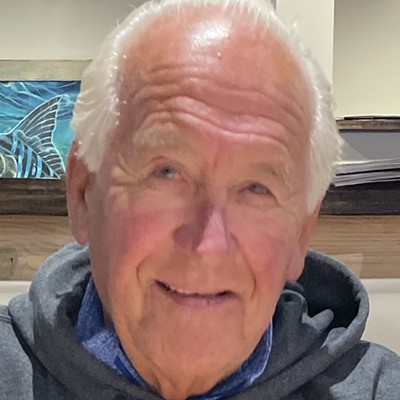
Comments
Comments are closed.
From 2014-2020, Seven Days allowed readers to comment on all stories posted on our website. While we've appreciated the suggestions and insights, right now Seven Days is prioritizing our core mission — producing high-quality, responsible local journalism — over moderating online debates between readers.
To criticize, correct or praise our reporting, please send us a letter to the editor or send us a tip. We’ll check it out and report the results.
Online comments may return when we have better tech tools for managing them. Thanks for reading.